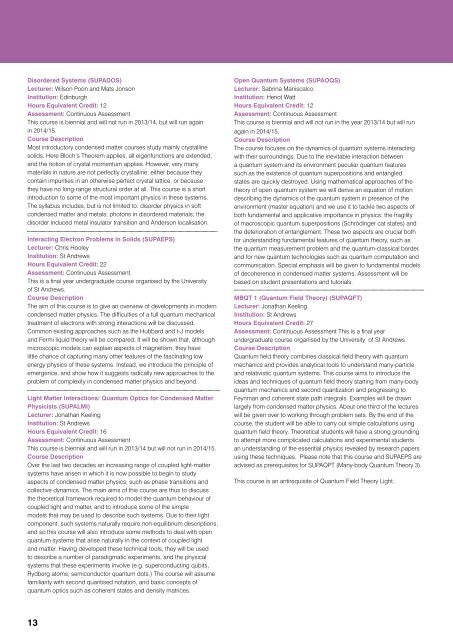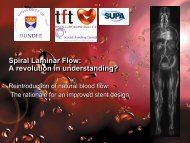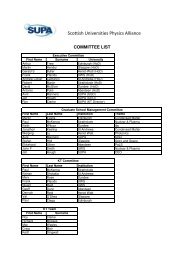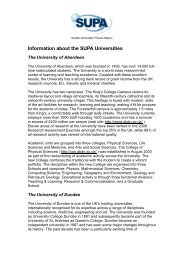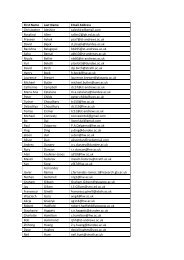Catalogue of Courses & Student Handbook - SUPA
Catalogue of Courses & Student Handbook - SUPA
Catalogue of Courses & Student Handbook - SUPA
You also want an ePaper? Increase the reach of your titles
YUMPU automatically turns print PDFs into web optimized ePapers that Google loves.
Condensed Matter and Material Physics<br />
Disordered Systems (<strong>SUPA</strong>DOS)<br />
Lecturer: Wilson Poon and Mats Jonson<br />
Institution: Edinburgh<br />
Hours Equivalent Credit: 12<br />
Assessment: Continuous Assessment<br />
This course is biennial and will not run in 2013/14, but will run again<br />
in 2014/15.<br />
Course Description<br />
Most introductory condensed matter courses study mainly crystalline<br />
solids. Here Bloch’s Theorem applies, all eigenfunctions are extended,<br />
and the notion <strong>of</strong> crystal momentum applies. However, very many<br />
materials in nature are not perfectly crystalline: either because they<br />
contain impurities in an otherwise perfect crystal lattice, or because<br />
they have no long-range structural order at all. This course is a short<br />
introduction to some <strong>of</strong> the most important physics in these systems.<br />
The syllabus includes, but is not limited to: disorder physics in s<strong>of</strong>t<br />
condensed matter and metals; photons in disordered materials; the<br />
disorder induced metal insulator transition and Anderson localisation.<br />
Condensed Matter and Material Physics<br />
Interacting Electron Problems in Solids (<strong>SUPA</strong>EPS)<br />
Lecturer: Chris Hooley<br />
Institution: St Andrews<br />
Hours Equivalent Credit: 22<br />
Assessment: Continuous Assessment<br />
This is a final year undergraduate course organised by the University<br />
<strong>of</strong> St Andrews.<br />
Course Description<br />
The aim <strong>of</strong> this course is to give an overview <strong>of</strong> developments in modern<br />
condensed matter physics. The difficulties <strong>of</strong> a full quantum mechanical<br />
treatment <strong>of</strong> electrons with strong interactions will be discussed.<br />
Common existing approaches such as the Hubbard and t-J models<br />
and Fermi liquid theory will be compared. It will be shown that, although<br />
microscopic models can explain aspects <strong>of</strong> magnetism, they have<br />
little chance <strong>of</strong> capturing many other features <strong>of</strong> the fascinating low<br />
energy physics <strong>of</strong> these systems. Instead, we introduce the principle <strong>of</strong><br />
emergence, and show how it suggests radically new approaches to the<br />
problem <strong>of</strong> complexity in condensed matter physics and beyond.<br />
Light Matter Interactions: Quantum Optics for Condensed Matter<br />
Physicists (<strong>SUPA</strong>LMI)<br />
Lecturer: Jonathan Keeling<br />
Institution: St Andrews<br />
Hours Equivalent Credit: 16<br />
Assessment: Continuous Assessment<br />
This course is biennial and will run in 2013/14 but will not run in 2014/15.<br />
Course Description<br />
Over the last two decades an increasing range <strong>of</strong> coupled light-matter<br />
systems have arisen in which it is now possible to begin to study<br />
aspects <strong>of</strong> condensed matter physics, such as phase transitions and<br />
collective dynamics. The main aims <strong>of</strong> this course are thus to discuss<br />
the theoretical framework required to model the quantum behaviour <strong>of</strong><br />
coupled light and matter, and to introduce some <strong>of</strong> the simple<br />
models that may be used to describe such systems. Due to their light<br />
component, such systems naturally require non-equilibrium descriptions,<br />
and so this course will also introduce some methods to deal with open<br />
quantum systems that arise naturally in the context <strong>of</strong> coupled light<br />
and matter. Having developed these technical tools, they will be used<br />
to describe a number <strong>of</strong> paradigmatic experiments, and the physical<br />
systems that these experiments involve (e.g. superconducting qubits,<br />
Rydberg atoms, semiconductor quantum dots.) The course will assume<br />
familiarity with second quantised notation, and basic concepts <strong>of</strong><br />
quantum optics such as coherent states and density matrices.<br />
Open Quantum Systems (<strong>SUPA</strong>OQS)<br />
Lecturer: Sabrina Maniscalco<br />
Institution: Heriot Watt<br />
Hours Equivalent Credit: 12<br />
Assessment: Continuous Assessment<br />
This course is biennial and will not run in the year 2013/14 but will run<br />
again in 2014/15.<br />
Course Description<br />
The course focuses on the dynamics <strong>of</strong> quantum systems interacting<br />
with their surroundings. Due to the inevitable interaction between<br />
a quantum system and its environment peculiar quantum features<br />
such as the existence <strong>of</strong> quantum superpositions and entangled<br />
states are quickly destroyed. Using mathematical approaches <strong>of</strong> the<br />
theory <strong>of</strong> open quantum system we will derive an equation <strong>of</strong> motion<br />
describing the dynamics <strong>of</strong> the quantum system in presence <strong>of</strong> the<br />
environment (master equation) and we use it to tackle two aspects <strong>of</strong><br />
both fundamental and applicative importance in physics: the fragility<br />
<strong>of</strong> macroscopic quantum superpositions (Schrödinger cat states) and<br />
the deterioration <strong>of</strong> entanglement. These two aspects are crucial both<br />
for understanding fundamental features <strong>of</strong> quantum theory, such as<br />
the quantum measurement problem and the quantum-classical border,<br />
and for new quantum technologies such as quantum computation and<br />
communication. Special emphasis will be given to fundamental models<br />
<strong>of</strong> decoherence in condensed matter systems. Assessment will be<br />
based on student presentations and tutorials.<br />
MBQT 1 (Quantum Field Theory) (<strong>SUPA</strong>QFT)<br />
Lecturer: Jonathan Keeling <br />
Institution: St Andrews <br />
Hours Equivalent Credit: 27 <br />
Assessment: Continuous Assessment This is a final year<br />
undergraduate course organised by the University <strong>of</strong> St Andrews <br />
Course Description <br />
Quantum field theory combines classical field theory with quantum<br />
mechanics and provides analytical tools to understand many-particle<br />
and relativistic quantum systems. This course aims to introduce the<br />
ideas and techniques <strong>of</strong> quantum field theory starting from many-body<br />
quantum mechanics and second quantization and progressing to<br />
Feynman and coherent state path integrals. Examples will be drawn<br />
largely from condensed matter physics. About one third <strong>of</strong> the lectures<br />
will be given over to working through problem sets. By the end <strong>of</strong> the<br />
course, the student will be able to carry out simple calculations using<br />
quantum field theory. Theoretical students will have a strong grounding<br />
to attempt more complicated calculations and experimental students<br />
an understanding <strong>of</strong> the essential physics revealed by research papers<br />
using these techniques. Please note that this course and <strong>SUPA</strong>EPS are<br />
advised as prerequisites for <strong>SUPA</strong>QPT (Many-body Quantum Theory 3).<br />
This course is an antirequisite <strong>of</strong> Quantum Field Theory Light.<br />
13


